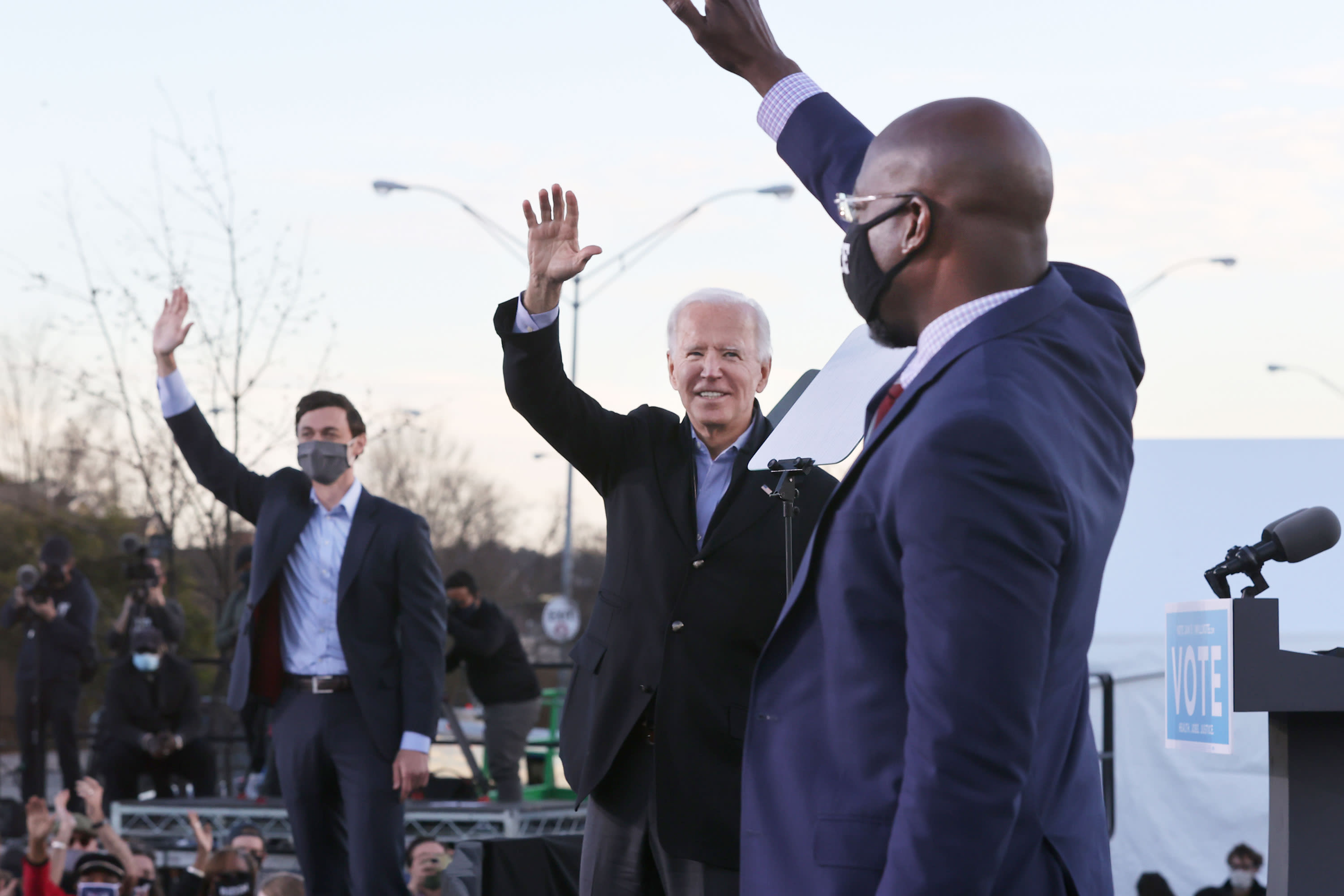President-elect Joe Biden (C) along with Democratic candidates for the U.S. Senate Jon Ossoff (L) and Rev. Raphael Warnock (R) greet supporters during a campaign rally the day before their runoff election in the parking lot of Centerparc Stadium in Atlanta.
Chip Somodevilla | Getty Images
A $15 federal minimum wage edged closer after Tuesday’s Georgia runoff election, which seems likely to flip Senate control and unify government under the Democratic Party.
Such a pay boost would more than double the current federal minimum wage, $7.25 an hour, but would likely face resistance from some Republicans and business groups.
The Rev. Raphael Warnock, a Democrat, won the U.S. Senate runoff in Georgia on Tuesday, beating the Republican incumbent, Sen. Kelly Loeffler, according to NBC News projections.
Democrat Jon Ossoff was leading Republican David Perdue, whose Senate seat expired Sunday, in the other Georgia race, which was too close to call midday Wednesday, according to NBC News.
Democratic victories in those contests would give Democrats control of the Senate, the House and the presidency. Congress is scheduled to confirm President-elect Joe Biden’s win over President Donald Trump on Wednesday.
“It’s absolutely a priority,” Mark Hamrick, senior economic analyst at Bankrate, said of Democrats passing legislation to set a higher pay floor.
More from Personal Finance:
$2,000 stimulus checks possible if Democrats win Senate majority
Scammers have stolen $36 billion in unemployment benefits
At Georgetown, tensions rise over the decision to keep distance learning
Democrats, especially those from the party’s liberal wing, have long pushed to raise the national minimum wage. Sen. Bernie Sanders of Vermont, an independent who typically votes with Democrats, said in a Tuesday tweet that a $15 minimum wage was at stake in Georgia’s runoff election.
Proponents of increasing the pay floor argue the current standard doesn’t provide a livable wage for Americans.
$15,080 a year
The federal minimum wage, currently $7.25 an hour, hasn’t been raised since 2009. That wage translates to $15,080 for a full-time, year-round worker, according to the National Employment Law Project.
Its value has eroded over time, since the wage doesn’t rise along with the cost of living.
Warnock and Ossoff are advocates for a $15 minimum wage, a point they stressed many times in recent months. Biden pledged to raise the wage floor to $15 an hour. The House voted to do so in 2019.
Several states, cities and counties recently increased their minimum wages, many to $15 or higher. Forty cities and counties will have met or exceeded a $15 minimum wage by the end of 2021, according to the National Employment Law Project.
“Over the last 40 years, what we’ve seen in America is that wages for working people have been crushed while returns to shareholders have gone through the roof,” Ossoff said on the campaign trail.
A higher wage would disproportionately help Black and Hispanic workers over other groups such as Whites and Asians, research shows. In December, Warnock called raising the minimum wage a “racial justice issue.”
Raising the wage would come at a time when low-wage earners and racial minorities have been disproportionately affected by job loss and poverty during the Covid pandemic.
Opposition
However, passing such legislation isn’t a given. If both Democrats win in Georgia, the Senate will be divided 50-50 between Democrats and Republicans, with Vice President-elect Kamala Harris able to deliver a tiebreaking vote in favor of Democrats. That majority would be shy of the threshold to prevent a filibuster.
The Republican-controlled Senate didn’t bring the Raise the Wage Act to a vote after the bill passed the House in 2019.
Some business groups, such as the Chamber of Commerce and National Federation for Independent Business, have expressed opposition, saying a $15 national minimum wage would raise labor costs and push employers to lay off workers.
Small businesses, which are less likely to have cash reserves or profit margins to absorb higher labor costs, would bear the brunt of those negative effects, the NFIB said earlier this year.
But momentum appears to be with Democrats on this issue due to overwhelming public support, Hamrick said.
“The economy was able to bear the brunt of that increase back [in 2009],” Hamrick said. “Obviously that year was challenging for other reasons [due to the Great Recession], but no one looks back on 2009 and says, ‘That was a big policy mistake.'”
